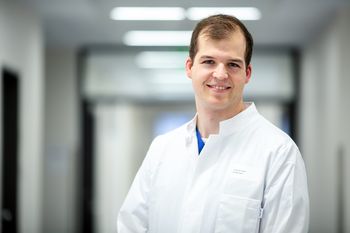Portraits
Portraits
Physicians made in Oldenburg

Six years after its foundation, the degree programme in human medicine at the University of Oldenburg has its first graduates. Among the four young doctors is Johannes Grone, who is doing his specialist training in Oldenburg.
He comes up to us in the hospital corridor: tall, open gaze, sympathetic smile. Johannes Grone clearly feels at home in his new working environment at Oldenburg Hospital. Just a few months ago he was a medical student "of the first hour" at the European Medical School Oldenburg-Groningen (EMS), he is one of the first four graduates. "I'm relieved and happy that I did so well in my studies - and now I'm still a little excited about what everyday medical life will really entail," says the 29-year-old Göttingen native, describing his current emotional state.
The fact that Grone has decided to do his specialist training at the University Clinic for Anaesthesiology, Intensive Care Medicine, Emergency Medicine and Pain Therapy (AINS) at the hospital and thus remain in Oldenburg pleases Clinic Director Prof. Dr. Andreas Weyland: "He will work with many colleagues here with us over the next five years and get to know all facets of our specialty." Weyland is sure that the young doctor is well prepared through his studies. "Johannes Grone has already proven that he is resilient, willing to learn and a team player. In addition, he has internalised a patient-oriented perspective at the EMS. These are all essential prerequisites for working with us at the clinic."
Grone came to the University of Oldenburg in 2012 and - without an A-levels - was offered the last available place to study medicine at the School V - School of Medicine and Health Sciences. He had a lot of experience in his luggage - gained as a community service volunteer in the ambulance service and during his work as a paramedic. Due to his excellent credits, he received a German scholarship five times and was always among the best. Together with his 39 fellow students, Grone always saw himself as part of the big picture: "We had the chance to help shape the degree programme. That's quite unique," he says, and his enthusiasm is palpable. "In the next few years we can show that we have become good doctors." What the young doctor particularly appreciated about his studies was the personal support and guidance he received from the doctors and chief physicians in the clinics. The practice-oriented teaching concept typical of Oldenburg University Medicine was also important to him. "Even in the first years of study, we were sometimes treated like doctors in the practical year. That was very appreciative. In addition, we had the opportunity to actively participate very early on, had direct contact with patients."
For Andreas Weyland, these special "Oldenburg advantages" are based on the good combination of theoretical basics and practical as well as communicative skills in the model study programme. Developing this, however, took time. So it is not surprising that Grone and his fellow students of the first cohort found the study programme and the compulsory year at the University Medical Centre Groningen (UMCG) a real challenge in several respects. "Many structures still had to emerge, processes were not well-rehearsed at the beginning." Today he can also appreciate this pioneering role: "I was one of the first to gain practical experience in Groningen. That definitely strengthened me on my way." Here, as there, he was able to gradually approach being a doctor, which he experienced as a great advantage.
For the newly qualified doctor, the approach is now over, the workload remains high. In addition to his training as a specialist, Grone is currently working on his doctoral thesis, which he is writing at the University Clinic for General and Visceral Surgery at the Pius Hospital in Oldenburg. He is also still involved in voluntary work: for example, with the Red Cross as a doctor on call or with the volunteer fire brigade. He now calls Oldenburg his home, and he also continues to feel very connected to the School. "I can imagine being involved in teaching at some point. I would also like to do research on anaesthesiology or emergency medicine topics one day," says Grone. The degree programme, which has a lot of research-based learning content, will also have prepared him well for this.


